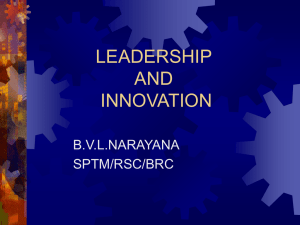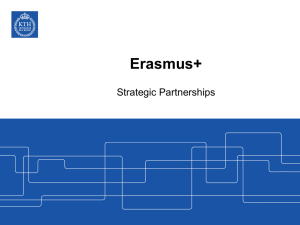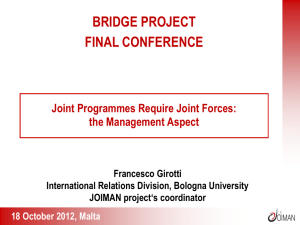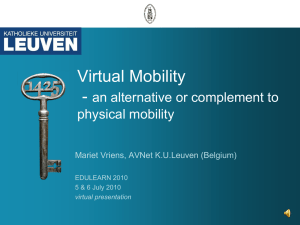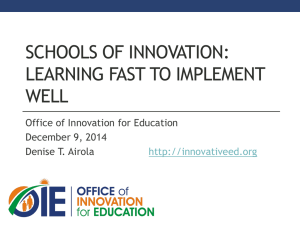European cooperation programmes 2014-2020
advertisement
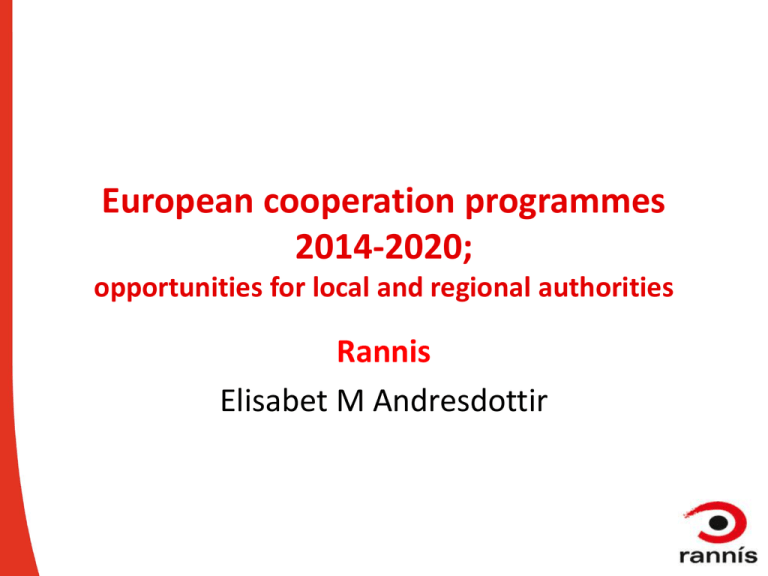
European cooperation programmes 2014-2020; opportunities for local and regional authorities Rannis Elisabet M Andresdottir What is Horizon 2020 • 78 billion euro research and innovation funding programme (2014-2020) • A core part of Europe 2020, Innovation Union & European Research Area: – Responding to the economic crisis to invest in future jobs and growth – Adressing people’s concerns about their livelihoods, safety and environment – Strengthening the EU’s global position in research, innovation and technology What‘s new • A single programme bringing toghether three separate programmes/inititatives – The Research Framework Programme (FP7) – Innovation aspects of Competitiveness and Innovation FP (CIP) – EU contribution to the European Institute of Innovation and Technology (EIT) • Coupling research to innovation – from research to retail, all forms of innovation • Focus on societal challenges facing EU society, e.g. health, clean energy and transport • Simplified access, for all companies, universities, institutes in all EU countries and beyond Three priorities 1. Excellent science – World class science is the foundation of tomorrow‘s technologies, jobs and wellbeing – Europe needs to develop, attract and retain research talent – Researchers need access tot he best infrastructures Industrial leadership – Strategic investments in key technologies, underpin innovation across existing and emerging sectors – Europe needs to attract more private investment in research and innovation – Europe needs more innovative SMEs to create growth and jobs Societal challenges – Concerns of citizens and society/EU policy objectives (climate, environment, energy, transpoert etc.) cannot be achieved without innovation – Breakthrough solutions come from multi disciplinary collaborations, including social sciences & humanities – Promising solutions need to be tested, demonstrated and scaled up Excellent science Proposed funding (million euro, 2014-2020) Industrial leadership • Proposed funding (million euro, 2014-2020) Societal challenges • Proposed funding (million euro, 2014-2020) Simplification • Single set of simpler and more coherent participation rules • New balance between trust and control • Moving from several funding rates for different beneficiaries and activities to just two • Rpeplacing the four methods to calculate overhead with a single flat rate (25%) • Successful applicants to get working more quickly: reduction of average time to grant by 100 days ( FP7 average around 350 days) FP7 in Iceland • • • • Number of proposals with Icelandic participation 912 218 contracts at the end of 2013 A total of €69.7 million to Iceland 2007-2013 Most active participation in Health, Food, Environment and Marie-Curie • One advanced ERC grant for The University of Iceland‘s Systems Biology Centre, led by Dr. Bernhard Pálsson • About 23% success rate in FP7 Calls of potential interest • Europe in a changing world: inclusive, innovative and reflective societies : Overcoming the Crisis: EURO-6-2015: Meeting new societal needs by using emerging technologies in the public sector New Forms of Innovation: INSO-1-2014/2015: ICT-enabled open government INSO-9-2015: Innovative mobile e-government applications by SMEs • ICT: ICT 7 – 2014: Advanced Cloud Infrastructures and Services • Transport: Urban mobility: MG5.2, MG5.3, MG5.4, MG5.5 Infrastructure: MG7.1, MG7.2 Intelligent transport systems: MG 8.1, MG8.2, MG8.4 Socio-economic and behavioural research and forward looking activities for policy making: MG9.1, MG9.2, MG9.3 • Energy: Energy Efficiency: EE4, EE5, EE8, EE9, EE10, EE14, EE19, EE20 and EE21. Competitive Low-Carbon Energy: LCE4 and LCE14 Smart Cities and Communities: SCC1, SCC4 Programmes of interest • • • • • • Transport Health Evironment ICT Energy Europe in a changing world: inclusive, innovative and reflective societies Calls of potential intrest I • Societal challenge: • INSO-1 2014/2015 Topic: ICT-Enabled open government • Energy: SCC-01-2015 Topic: Smart Cities and Communities solutions integrating energy, transport, ICT sectors through lighthouse (large scale demonstration - first of the kind) projects • Energy: EE 7 – 2014/2015: Enhancing the capacity of public authorities to plan and implement sustainable energy policies and measures • Transport MG.5.4-2015. Strengthening the knowledge and capacities of local authorities Calls of potential interest II • Energy: EE 7 – 2014/2015: Enhancing the capacity of public authorities to plan and implement sustainable energy policies and measures • Energy: SCC-01-2015 Topic: Smart Cities and Communities solutions integrating energy, transport, ICT sectors through lighthouse (large scale demonstration - first of the kind) projects Transport • MG.5.4-2015. Strengthening the knowledge and capacities of local authorities Specific challenge: Achieving sustainable urban mobility requires the adoption of new strategic planning approaches at the local level. However, very few authorities undertake a sound analysis of trends, develop scenarios and provide the necessary long term policies and focus. Without strengthening of authorities' knowledge and capacities, a transformation of urban mobility planning will not be achieved. Scope: Proposals should address one of the following domains: Promoting take up of the innovative concept of Sustainable Urban Mobility Plans (SUMPs). Proposals from large networked groups of local authorities should include instruments and mechanisms for information exchange to assist them in preparing and implementing SUMPs. The plans should build on a solid methodology13 and include quantified targets. Proposals should ensure that the plans comprise a long-term vision, build on local consultation and interdepartmental coordination, include monitoring and evaluation, address financing options, and consider a wide range of measures, including newly-emerging technologies, policy-based, and soft measures. Enhancing the capacities of local authorities and other stakeholders to successfully plan and implement innovative sustainable mobility measures, technologies and tools, on the basis of reliable data and analysis. Sustainable financing should play a key role, which means that special attention should be given to setting up business cases, innovative procurement, the development of bankable projects and partnerships. The Commission considers that proposals requesting a contribution from the EU of between EUR 2 to 4 million each would allow this specific challenge to be addressed appropriately. Expected impact: The action(s) on Sustainable Urban Mobility Plans will generate a high leverage factor, especially in regions and cities where take up is so far low and the impacts from transport are severe. Participants should show a strong commitment on the preparation and implementation of the plans. The action(s) on capacity building will produce validated, practical and replicable tools and methods with guidance and training material, resulting in a maximum reach of the target audience. Health • PHC 29 – 2015: Public procurement of innovative eHealth services Specific challenge: The sustainability of pilot and demonstration solutions and services is broadly perceived as one of the biggest challenges in streamlining healthcare delivery processes and in improving cost efficiency while maintaining or improving patient safety. The pace of development has been slow and penetration of ICT still has high growth potential in healthcare compared to other public or private sectors. This activity facilitates public purchasing of innovative solutions in healthcare which have not yet been deployed on a large scale. Scope: The proposals should improve sustainable deployment of new or improved services by healthcare service procurers in line with the eHealth Action Plan15. Examples of target outcomes for healthcare delivery may include addressing early hospital discharge, delivery of healthcare in remote, sparsely populated and difficult to access regions, eHealth services for mobile EU patients, and pre/post operation care outside the hospital environment. The scope of the PPI pilot(s) is to specify, purchase and deploy ICT based solutions which can deliver sustainable, new or improved healthcare services and improve the ecosystem in which procurement approaches for innovative healthcare solutions are successfully applied. • • • Solutions should be based on a complete set of common specifications for technology and end to end services; The implementation phase should have the ambition to reach a large scale across multiple regions of Europe; Proposals must engage public and/or private procurers from each country participating (at national, regional or local level) that have responsibilities and budget control in the relevant area of care or supply of services; Public Demand Driven Innovation PCP and PPI in Horizon 2020 • Pre-commercial procurement in the field of scientific instrumentation (PCP) – Proposals will define requirements and terms of reference for common procurement of scientific instrumentation and organize joint PCP action encouraging research, development and validation of breakthrough solutions that can bring radical scientific and efficiency improvements in research infrastructures services. • Public procurement of innovative scientific instrumentation (PPI) – Proposals will focus on organizing joint procurement of innovative instrumentation by research infrastructures to enhance their services, better serving their communities. Participant Portal • Information on calls and funding opportunities in Horizon 2020 – Participant Portal http://ec.europa.eu/research/participants/portal/ desktop/en/home.html – Rannis – www.rannis.is Erasmus+ • Learning mobility of individuals • Cooperaton for innovation and exchange of good practices • Support for policy reform 3 main types of Key Action • Learning mobility of individuals (KA1) – Staff mobility, in particular for teachers, lecturers, school leaders and yourt works – Mobility for higher education students, vocational education and training students – Student loan guarantee – Joint Mater Degrees – Mobility for higher education for EU and non EU beneficiaries – Voulunteering and youth exchanges Cooperation for innovation and exchange of good practices (KA2) • Strategic partnerships between education/training or youth organisations and other relevant actors • Large scale partnerships between education and training establishments and business: Knowledge Alliances & Sector Skills alliances • IT-Platforms including e-Twinning • Cooperation with third countries and focus on neighbourhood countries Support for policy reform (KA3) • • • • • Open method of Coordination Prospective initiatives EU recognitions tools Dissemination & exploitation Policy dialogue with stakeholders, third countries and international organisations Incorporation of programmes • Three of the thirteen EU programmes in which one or more of the EEA EFTA States intend to participate have been incorporated into the EEA Agreement. – Horizon 2020, – Erasmus+ and – Creative Europe • Four programmes are scheduled to be adopted on the EEA Joint Committee meeting on 27 June 2014 • Employment and Social Innovation, • Civil Protection Mechanism, • COSME • Statistical Programme Two more programmes are planned to be adopted at the EEA Joint Committee meeting on 9 July 2014 Connecting Europe Facility (ICT-part) Rights, Equality and Citizenship Programme • The EU side has informed the EFTA Secretariat that the four remaining programmes; the Consumer Programme, the Health Programme, Galileo and Copernicus will not be adopted by Council in time for the EEA Joint Committee meeting on 9 July 2014 but that they are looking into ways to ensure EEA EFTA participation as of 2014.

